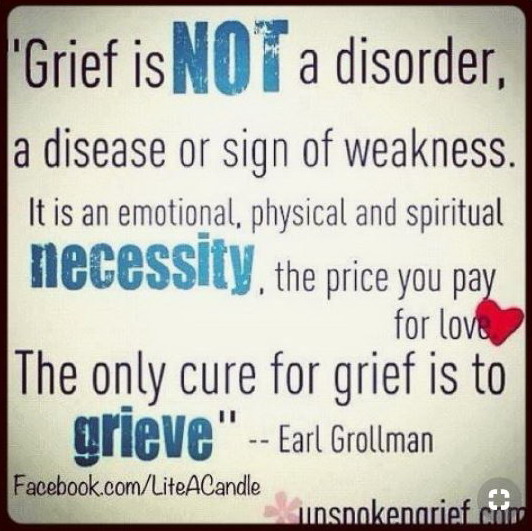
As the holidays approach, despite the celebrations, gift giving and merriment, many experience the pain of going through festive times in the wake of recent loss. Others are haunted by past memories of departed loved ones. Death, divorce, losing a job are just a few of the kinds of losses that seem more difficult at this time of year. Likewise, when folks come together and gather round the table, the absence of parted family and friends , makes for a complicated and confusing time.
For those who are the friends and family of those who have suffered losses, the holidays can be tricky as well. Not knowing what to say or how to act often makes for awkward or uncomfortable encounters.
Understandably, but unfortunately, our upbringing and culture has not been helpful in educating us on how to grieve or how to support those who are grieving. What we have been exposed to in the media emphasizes the more joyous and commercial aspects of this season but often neglects its more serious or spiritual dimensions . Sadly, those who are newly alone or for whom the pain of grief is intense, will tell you that the upbeat Norman Rockwell images are not helpful. Here are some tips to help you and those your love better deal with grief and grieving .
The Most Common Misunderstandings about Grief :
- It is the same for everyone. People are not all alike and they do not grieve all alike. The famous Five Stages are observed aspects of the overall grieving process but it is not a linear, tidy or uniform process.
- Grief that lasts “too” long is a sign of mental illness and should be medicated. Patience on the part of the griever and his/her friends and family is a virtue. Working through grief takes as long as it takes and can’t be hurried or rushed. Only in complicated grief situations where functioning is severely impaired and the individual is stuck would medication be recommended.
- Women grieve more than men. While women may have been socialized to express vulnerable feelings more easily but men feel grief as well. They may show it in a different form such as irritability but men experience thr pain of grief to the same extent as women do.
- Talking about it just makes it worse. Some conversations may feel uncomfortable but ultimately relief and greater understanding is what most experience. If one shares one’s feelings with another person, it is important that the listener be trustworthy and able to keep what is said confidential.
- Grieving the loss of a pet is not real grief. Grief is grief – regardless what it is about. If a person, animal, thing, activity or capability is meaningful to you and it is lost to you or you are no longer able to do it, you will feel the pain of the loss and need to reconfigure your life and expectations without it. There is no difference between the resulting grief for a person or a pet. That said, folks who hurt over the loss of a cherished pet often are reluctant to talk about it for fear of being criticized or ridiculed.
- Losses can destroy one’s faith and the meaning of life. It can for a while but … one of the ways folks know that they have “worked through” their grief is that a new sense of meaning and purpose re-merge. Having or not having a sense of transcendent purpose is a crucial indicator of recovery for those who have suffered post-traumatic experiences as well. It is also true that the experience of a significant loss and a difficult grieving period can change and even deepen one’s sense of the divine and redirect a person’s values and sense of purpose.
 I really like these thoughts.
I really like these thoughts.
Tips for Coping with Grief and the Bereaved during the Holidays
- Trust your own experience. Don’t believe it when people tell you that you are doing it the wrong way. Don’t forget that folks who tell you that you are taking “too” long to “get over” a loss are threatened by your experience and want you to get past it so they can feel better. Their comment expose their problem with grieving not yours. People experience and process loss in very unique ways. If you feel stuck, however, or want help, there are many places to which to turn. Most mental health professionals are well trained and ready to help.
- Grief is not only a normal reaction to loss but grieving is also a necessary part of the recovery process which will, over time, lessen the pain and help things feel normal again.
- Give yourself permission to feel and express whatever you experience even if your thoughts and feelings aren’t nice. Likewise, don’t panic if you don’t feel anything. Grieving takes longer than we sometimes expect and … that is Okay.
- Try writing in a journal. A confidential journal is a safe place to ventilate and talk out those thoughts and feelings you are uncomfortable with and don’t want others to know about.
- Set some time aside to remember those who have passed on or who are no longer with you. Dig out photos. Talk about and share special memories with those who knew your loved one. Laughter over humorous stories are especially healing and broaden our perspective of the person we miss.
- Think about what you need and what changes in your holiday plans your loss requires, including cancelling the holiday all together. Focus on self-care and addressing the stress created by the holidays and your experience of loss.
Grieving is never pleasant but then, as the poster says, it is the price we pay for love.
Rev. Michael Heath, LMHC, Fellow AAPC December 14, 2018
Image attribution: https://thelifeididntchoose.com/2017/12/01/how-to-survive-december-with-a-broken-heart/


